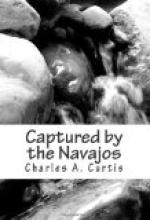“Pardon me,” replied Manuel, “but it is not safe to remain here longer. Elarnagan, whom you saw leaving the valley with his warriors, is intending to move down the Lithodendron to attack your train somewhere on the Colorado Chiquito.”
At the close of his remarks Manuel turned away, as if to mount his horse, and then, as if correcting an oversight, he said, “Wait one moment, sir.” Going up to the third boy, he spoke a few words to him in an unknown tongue. The boy sprang to the ground and came forward. “This is Sapoya,” continued Manuel, “a Cherokee boy, whom I found a captive when I joined Elarnagan’s band. He is my brother, and will go with me and share my home.”
Sapoya extended his hand and clasped mine. He was a handsome Indian boy, about the same age and height as his friend. He addressed me in Navajo, which was interpreted by Manuel: “I am glad to meet one who has helped to open the broad land again to my brother and me. But our horses stand still, while those of our enemy fly to retake us.”
Evidently the Mexican and Cherokee boys had no desire to again fall into the hands of the Navajo chief. We made no further delay, but mounted and forced our animals down the mountain defiles as rapidly as possible. As soon as the route would permit, Henry and Manuel rode on each side of Frank, and I heard the former ask about Vic. Frank answered in Spanish, so that the Mexican boy might understand. Such expressions as “La perra brava!” “La fina perrita Vic!” from time to time showed they were hearing of Vic’s adventures.
[Illustration: “’GOD HAS GIVEN ME, AMONG MANY FRIENDS, TWO THAT ARE SOMETHING MORE’”]
Finding that Corporal Frank was not doing himself justice in his narration, I drew alongside the boys and related what I knew of Frank’s midnight ride and rescue of Vic, an event which, had it not occurred, would have left Henry and his friends still in captivity. At the conclusion of my tale Manuel changed his position from the flank to one between the brothers, and, taking a hand of Frank in his left, and one of Henry’s in his right, rode on a few moments in silence. Then he said: “God has given me, among many friends, two that are something more. But for your brave acts I should still be a captive. Thank you for myself, my dear mother, and Sapoya.”
Having reached the wagon-road crossing of the Carizo, we turned at a canter over the divide between it and the Lithodendron. As we rose above a terrace our attention was attracted to two mounted Indians scurrying off into the broken and higher country on our right.
“Ah, look!” shouted Manuel; “they expected to stop three naked, unarmed boys, and they are surprised to meet a troop of cavalry! Viva los Estados Unidos! Run, you sheep-stealers, we are safely out of your hands!”
Upon reaching the summit of the divide the whole war-party stood revealed, far to our right, out of rifle-shot. Plainly, our presence was a great surprise to them. Although they greatly outnumbered us, the country was too open for their system of warfare, and they were poorly armed. They stood sullenly aloof, and allowed us to canter past unmolested.




